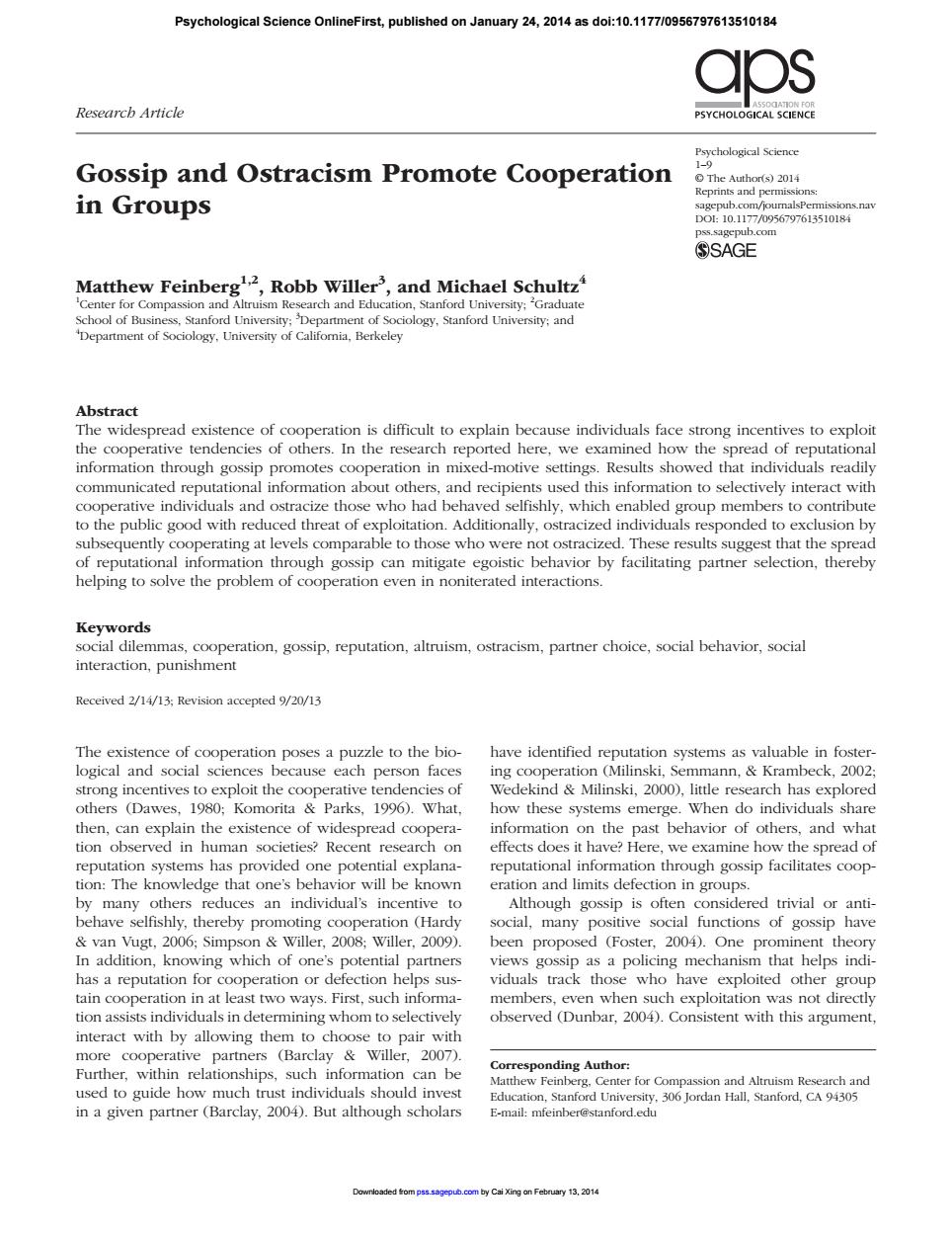正在加载图片...

Psychological Sclence OnlineFirst,published on January 24,2014 as dol:10.1177/0956797613510184 Research Article PSYCH Gossip and Ostracism Promote Cooperation The Author(s)201 in Groups 0.1177 567y761351018 SAGE ercinbergn obb winc chultz Matthew Feinbe earch and Ed Department of Socology,University of Califom Berkeley Abstract The widespread existence of cooperation is difficult to explai ecause individuals face strong incentives to exploi the te s.In the d here h of rep communicated information about other and recin used this information to select cooperative individuals and ostracize those who had behaved selfishly,which enabled group members to contribute to the public good with reduced threat of exploitation.Additionally,ostracized individuals responded to exclusion b operating a helping to solve the problem of cooperation even in noniterated ation,gossip,reputation .altruis cisn choice,social behavior,social Received 2/14/1 Re cepted 9/20/12 The of c zle to the bio aluable in fost on faces strong incentives to exploit the cooperative tendencies of Wedekind&Milinski,2000),litte research has explored others (Dawes 1980:Komorita Parks.1996). What these systems emerge.When do individuals share .can expl the existen of widespread coopera orm on c the past behavior of other and w ha ntial exnlan ional info ion thr tion:The knowledge that one's behavior will be known eration and limits defection in groups by many others reduces an individual's incentiv to Although gossip is often considered trivial or anti- thereby proming cop social,many pos unctions or gossip nav which of een propo 00 hat ent has a reputation for cooperation or defection helps sus viduals track those who have exploited other group tain cooperation in at least two ways.First,such informa members, even when such exploitation was not directly on assists s in observed (Dunbar,2004).Consistent with this argument with ing the 200- used to guide how much trust individuals should invest in a given partner(Barclay,2004).But although scholars E-mail:mfeinber@estanford.edu 1,2014 Psychological Science 1–9 © The Author(s) 2014 Reprints and permissions: sagepub.com/journalsPermissions.nav DOI: 10.1177/0956797613510184 pss.sagepub.com Research Article The existence of cooperation poses a puzzle to the biological and social sciences because each person faces strong incentives to exploit the cooperative tendencies of others (Dawes, 1980; Komorita & Parks, 1996). What, then, can explain the existence of widespread cooperation observed in human societies? Recent research on reputation systems has provided one potential explanation: The knowledge that one’s behavior will be known by many others reduces an individual’s incentive to behave selfishly, thereby promoting cooperation (Hardy & van Vugt, 2006; Simpson & Willer, 2008; Willer, 2009). In addition, knowing which of one’s potential partners has a reputation for cooperation or defection helps sustain cooperation in at least two ways. First, such information assists individuals in determining whom to selectively interact with by allowing them to choose to pair with more cooperative partners (Barclay & Willer, 2007). Further, within relationships, such information can be used to guide how much trust individuals should invest in a given partner (Barclay, 2004). But although scholars have identified reputation systems as valuable in fostering cooperation (Milinski, Semmann, & Krambeck, 2002; Wedekind & Milinski, 2000), little research has explored how these systems emerge. When do individuals share information on the past behavior of others, and what effects does it have? Here, we examine how the spread of reputational information through gossip facilitates cooperation and limits defection in groups. Although gossip is often considered trivial or antisocial, many positive social functions of gossip have been proposed (Foster, 2004). One prominent theory views gossip as a policing mechanism that helps individuals track those who have exploited other group members, even when such exploitation was not directly observed (Dunbar, 2004). Consistent with this argument, 510184PSSXXX10.1177/0956797613510184Feinberg et al.Gossip and Ostracism Promote Cooperation research-article2014 Corresponding Author: Matthew Feinberg, Center for Compassion and Altruism Research and Education, Stanford University, 306 Jordan Hall, Stanford, CA 94305 E-mail: mfeinber@stanford.edu Gossip and Ostracism Promote Cooperation in Groups Matthew Feinberg1,2, Robb Willer3 , and Michael Schultz4 1 Center for Compassion and Altruism Research and Education, Stanford University; 2 Graduate School of Business, Stanford University; 3 Department of Sociology, Stanford University; and 4 Department of Sociology, University of California, Berkeley Abstract The widespread existence of cooperation is difficult to explain because individuals face strong incentives to exploit the cooperative tendencies of others. In the research reported here, we examined how the spread of reputational information through gossip promotes cooperation in mixed-motive settings. Results showed that individuals readily communicated reputational information about others, and recipients used this information to selectively interact with cooperative individuals and ostracize those who had behaved selfishly, which enabled group members to contribute to the public good with reduced threat of exploitation. Additionally, ostracized individuals responded to exclusion by subsequently cooperating at levels comparable to those who were not ostracized. These results suggest that the spread of reputational information through gossip can mitigate egoistic behavior by facilitating partner selection, thereby helping to solve the problem of cooperation even in noniterated interactions. Keywords social dilemmas, cooperation, gossip, reputation, altruism, ostracism, partner choice, social behavior, social interaction, punishment Received 2/14/13; Revision accepted 9/20/13 Psychological Science OnlineFirst, published on January 24, 2014 as doi:10.1177/0956797613510184 Downloaded from pss.sagepub.com by Cai Xing on February 13, 2014